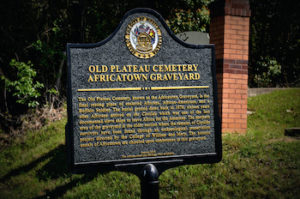
*Africatown, Alabama, was founded on this date in 1872. This historic African community is three miles north of downtown Mobile, Alabama.
It was founded by a group of 32 West Africans, who, in 1860, were included in the last known illegal shipment of African slaves to the United States. The Atlantic slave trade had been banned since 1808, but 110 enslaved people held by the Kingdom of Dahomey were smuggled into Mobile on the Clotilda, which was burned and scuttled to try to conceal its illicit cargo. More than 30 people, believed to be ethnic Yoruba and Fon, founded and created their community in what became Africatown. They retained their West African customs and language into the 1950s, while their children and some elders also learned English.
Cudjo Kazoola Lewis, one of the founders of Africatown, lived until 1935 and was long thought to be the last survivor of the slaves from the Clotilda. In 2019, scholar Hannah Durkin from Newcastle University documented Redoshi, a West African woman now believed to be the last survivor of slaves from the Clotilda. Also known as Sally Smith, she lived in 1937. She was sold to a planter in Dallas County, Alabama. Redoshi and her family continued to live there after emancipation, working on the same plantation. Most of the community now lies within Mobile's city limits. Its people passed down the story of its founders and how they were brought to the United States, preserving their history through families, the church, and schools.
The government appropriated part of the community's land to develop the western approach of the Cochrane-Africatown USA Bridge, completed in 1992. In 1997, descendants and friends formed the Africatown Community Mobilization Project to seek recognition of an Africatown Historic District and encourage the restoration and development of the town site. In 2000, it submitted documentation as a Local Legacy Project to the Library of Congress through Representative Sonny Callahan from Alabama's 1st congressional district. Defined as roughly bounded by Jakes Lane, Paper Mill and Warren roads, and Chin and Railroad streets, the historic district was designated in 2009 as a site on Mobile's African American Heritage Trail.
The Africatown Historic District was subsequently affirmed as significant by the state and the National Park Service, and it was listed on the National Register of Historic Places on December 4, 2012. This area was developed for mills and other industrial uses, given its location along waterways, especially in the early 20th century. A paper plant was built in 1928 and operated for decades on land first owned by A. Meaher, Jr. on the edge of Africatown. Residents say they have serious industrial pollution and public health problems, which have caused a high cancer rate since the late 20th century. In 2017, about 1,200 residents launched a lawsuit against International Paper (IP), as this company had owned the now-shuttered paper plant. The environmental group seeking Environmental Justice said that IP's improper handling of waste through the decades contaminated the land and water, and the company did not clean up the site as required after closing the plant.
The population of Africatown has declined markedly from a peak population of 12,000 in the 20th century when paper mills operated there. In the early 21st century, the community has about 2,000 residents. An estimated 100 of them are descendants of the people from the Clotilda. Other descendants live across the country. In 2009, the neighborhood was designated as a site on Mobile's African American Heritage Trail. The Africatown Historic District was listed on the National Register of Historic Places in 2012. It is related to Old Plateau Cemetery, Africatown Graveyard, founded in 1876. It has been given a large historical plaque telling its history.